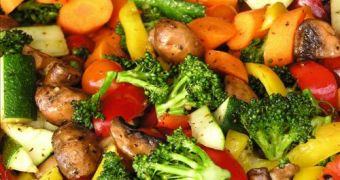You are an animal lover, and you have decided not to eat anything coming from an animal. But with the meat and animal products out, you're going to miss many minerals, vitamins and nutrients. Watch out to this:
1. Proteins are the "bricks" of the organism, and must contain all the essential aminoacids, in precise proportions. Only proteins from eggs, meat, fish and dairy products are complete, that's why plant proteins must be supplemented by animal proteins coming from dairy products or eggs twice a day, especially in the case of children. Calcium absorption is eased by the consumption of skimmed or low fat milk.
Those following a completely veggie diet must combine the incomplete proteins contained in the legumes with complementary proteins. Complementary families of proteins are legumes with cereals, legumes with seeds, legumes with nuts.
The best proportion is 60 % cereal proteins, 35 % legume proteins and 5 % vegetable proteins. Be aware that nuts contain 50-70 % fats, that's why they do not represent a good source of proteins. Complementary proteins are better assimilated if consumed at different meals of the same day.
2. Vitamin B12. All plants are poor in vitamin B12, that's why in the case of vegetarian diets, you must take supplements of vitamin B12 or soy milk. Milk, soy milk and eggs have high levels of B12.
Low amounts of vitamin B12 cause pernicious anemia and nerve tissue degeneration (which can be irreversible and deadly). Smoking aggravated deficiencies of vitamin B12.
3. Vitamin D. Deficiencies of vitamin D were found especially in totally vegetarian children. If the diet does not contain vitamin D enriched milk, sun exposure and vitamin supplements are recommended.
4. Vitamin E. Milk is rich in vitamin E, and in the case of those completely vegetarians, more cereals, legumes and yeast can replace the animal sources.
5. Calcium. Total vegetarians, especially women, have low levels of calcium, fact that can trigger various issues, like osteoporosis. That's why for those completely vegetarian, supplemented soy milk, oxalate-poor vegetables, sunflower and sesame seeds are recommended. Be aware that too many dietary fibers can slow down calcium absorption.
6. Iron improves blood quality and immunity, increases stress resistance and can be found in green vegetables, nuts, and whole cereals. The number of anemic veggies does not differ significantly compared to meat eaters. The iron level can be boosted by iron supplements accompanied by vitamin C.
7. Zinc is crucial in wound healing and presents a low level amongst vegetarians, especially women, due to the plant diet, poor in this element. Good sources of zinc are the fat cheeses, like Cheddar, Parmesan or even tofu.

 14 DAY TRIAL //
14 DAY TRIAL //